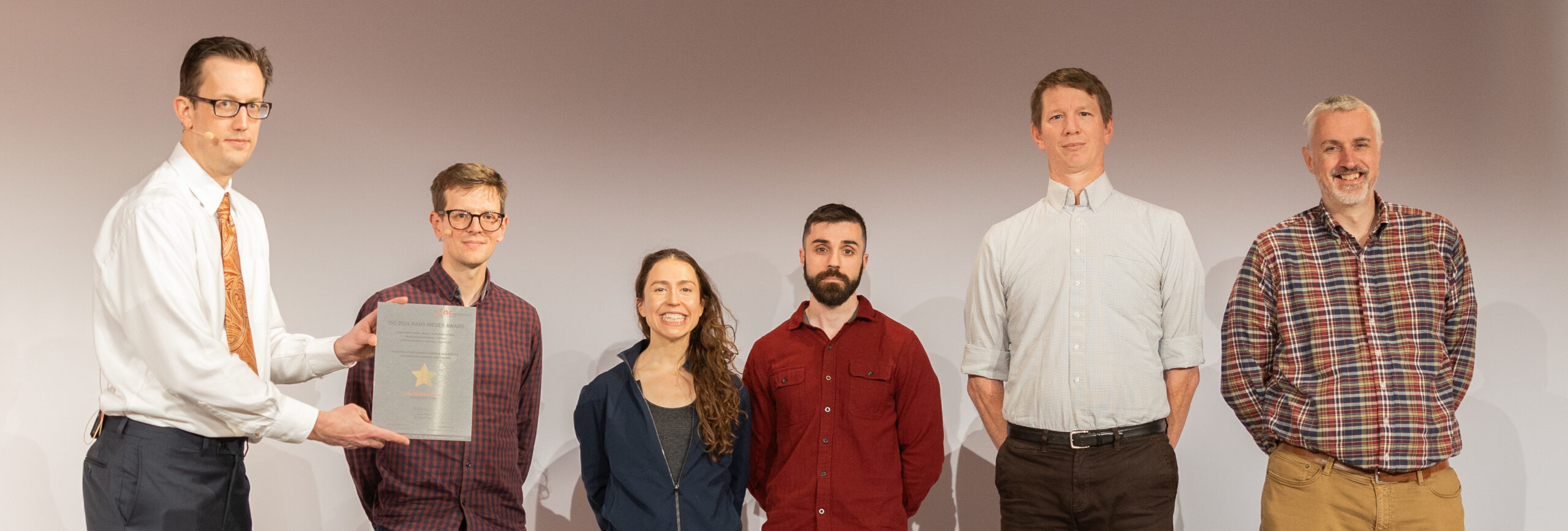RESEARCH PAPER
SUBMISSION
Sessions
JUNE 10-12, 2025
RESEARCH PAPER SUBMISSION

RESEARCH PAPER CHAIR
Amanda Randles, Duke University, USA
Proceedings CHAIR
Tobias Weinzierl, Durham University, UK
RESEARCH PAPER Deputy CHAIR
Hatem Ltaief, KAUST, Saudi Arabia
Proceedings Deputy CHAIR
Erin Carson, Charles University, Prague
Calling all researchers, scientists, and engineers! Irrespective of your sector, if your research can contribute to the future of high performance computing, artificial intelligence, high performance data analytics, quantum computing, or new and emerging technologies, we are eager to receive your research proposal!
All papers presented at ISC 2025 will be published as fully open access in the IEEE Xplore Digital Library. ISC will cover all publication costs to increase the visibility of the research presented at ISC and create access to a broader community.

Dec 10, 2024 Dec 20, 2024 11:59 pm AoE (extended)
Full Submission Deadline
FEB 28, 2025
Notification of Acceptance
JUN 10-12, 2025
Research Paper Sessions
All Dates
Feb 8-12, 2025
Author Rebuttals
MAY 19, 2025
Short pre-recorded Video due
MAR 31, 2025
Camera-Ready Submission
INFORMATION FOR SPEAKERS
For guidance on preparing and delivering your presentation, please refer to our Speaker Manual, which provides all necessary details for your upcoming contribution at ISC.
TOPIC AREAS
The Research Paper Committee encourages the submission of high-quality papers reporting original work in theoretical, experimental, and industrial research and development in any of the following six topic areas.
System Architecture & Hardware Components
- Beyond Moore’s Law
- Composable Disaggregated Infrastructure
- Data Center Infrastructure and Cooling
- Emerging Computing Technologies
- Extreme-scale Systems
- Heterogeneous System Architectures
- Interconnects and Networks
- Memory Technologies and Hierarchies
- Storage Technologies and Architectures
- Sustainability and Energy Efficiency
Programming Environments & System Software
- Compiler and Tools for Parallel Programming
- Energy Management
- HPC in the Cloud and HPC Containers
- Parallel File Systems
- Parallel Programming Languages
- Resource Management and Scheduling
- Runtime Systems for HPC
- System and Performance Monitoring
Algorithms, Methods & Performance
- Extreme-scale Algorithms
- Mixed Precision
- Novel Algorithms
- Numerical Libraries
- Optimizing for Energy and Performance
- Performance and Resource Modeling
- Performance Measurement
- Performance Tools and Simulators
Applications & Use Cases
- Application Workflows for Discovery
- Bioinformatics and Life Sciences
- Chemistry and Materials Science
- Computational Physics
- Earth, Climate and Weather Modeling
- Engineering
- Geosciences and Energy Generation
- Industrial Use Cases of HPC, ML and QC
- Visualization and Virtual Reality
Machine Learning & AI
- AI Applications powered by HPC Technologies
- Digital Twins and ML
- High-Performance Data Analytics
- HPC Simulations enhanced by Machine Learning
- HW and SW Design for Scalable Machine Learning
- Large Language Models and Generative AI in HPC
- ML Systems and Tools
Quantum Computing
- Integration of Quantum Computing and HPC
- Quantum Computing – Basics and Theory
- Quantum Computing – Technologies and Architectures
- Quantum Computing – Use Cases
- Quantum Program Development and Optimization
- Simulating Quantum Systems
Submission Guidelines
- Upload your research paper in PDF format, up to 10 pages (references don’t count in the page limit). Use double-column text in a single-spaced 10-point font on 8.5×11-inch pages. IEEE strongly encourages the use of conference manuscript templates on its website.
- Authors may include as many pages of appendices as they wish, but reviewers are not required to read these. If you wish to include an appendix, please add it after your references and keep in mind the double blind guidelines.
- If any content in the Research Paper is generated using Artificial Intelligence tools, authors must transparently and thoroughly describe their use in the methods, acknowledgment, or equivalent section of the paper. Description is not necessary for tools used solely for improving spelling, grammar, and general editing. Authors are accountable for the accuracy of information provided by AI tools and for referencing any supporting work based on that information.
- The double-blind review process applies to all submissions (see ISC High Performance Double-Blind Review Guidelines). Please refrain from including names, affiliations, funding sources, or acknowledgments in the heading or body of the document. Authors should cite their own work in a third-party manner rather than redacting the citations.
- Papers submitted for the Research Papers track should not have been previously published or under peer review for a different venue. Papers pre-posted to arXiv, institutional repositories, and personal websites remain eligible for submission.
- Membership on a program committee does not inherently create a conflict of interest in submitting a paper.
Review Process
- Each paper is expected to receive a minimum of 3 to 4 reviews
- Papers will be evaluated based on novelty, fundamental insights, clarity of presentation, and potential for long-term impact
- Reviewers will provide constructive, actionable feedback that can be used to improve the paper, whether it is eventually accepted or not
- The Research Paper Committee reserves the right to reject incorrectly formatted papers
Rebuttal Phase
- Initial reviewer comments will be made available to the authors by the committee
- Authors can respond to clarify misunderstandings and answer questions
- Rebuttals will be submitted in written format and will have a tight deadline
- Authors will receive additional instructions via email
Final Decision
- The paper’s track committee will consider all reviews and rebuttals
- Live reviewer discussions will occur during the research paper committee meeting
- A consensus-driven approach will be used to select the strongest papers
- Notification of the papers’ outcomes will be sent to authors after the program committee’s meeting
Terms & Conditions
- The research paper sessions will be held from June 10-12, 2025.
- By submitting a research paper, you agree that one of the authors will present the work in person at ISC 2025.
- For a paper to be included in the IEEE Xplore proceedings, at least one author must present it at the conference in person. Otherwise, the paper will be excluded from the proceedings.
- One author is eligible for a complimentary conference participation pass.
- Every paper presenter needs to submit a short, pre-recorded summary video of the paper before the conference.
- Presentation slides and short videos will be available on the event platform (Swapcard) for registered attendees.
- Travel, accommodation, registration fees for other authors, and other such expenses will not be covered by the ISC organizers.
Hans Meuer Award
Named in honor of ISC’s founding father, the winning research paper will receive a 3000 euro cash prize and an award certificate.

ISC 2024 Research Paper Award Winners
Research Paper committee
ISC 2025 Research Paper Committee
- Amanda Randles, Duke University, United States of America (Chair)
- Hatem Ltaief, KAUST, Saudi Arabia (Deputy Chair)
Algorithms, Methods & Performance
- Piotr Luszczek, Innovative Computing Laboratory, United States of America (Chair)
- Hartwig Anzt, University of Tennessee, Technical University of Munich, Germany
- Evgenij Belikov, Edinburgh Parallel Computing Centre (EPCC), The University of Edinburgh, United Kingdom
- Luc Berger-Vergiat, Sandia National Laboratories, United States of America
- Terry Cojean, Eviden, France
- Anthony Danalis, University of Tennessee Knoxville, United States of America
- Christian Engelmann, Oak Ridge National Laboratory, United States of America
- Ganesh Gopalakrishnan, University of Utah, United States of America
- Amal Gueroudji, Argonne National Laboratory, United States of America
- Georg Hager, University of Erlangen-Nuremberg, Erlangen Regional Computing Center, Germany
- Thomas Herault, ,
- Andreas Herten, Jülich Supercomputing Centre, Germany
- Sascha Hunold, TU Wien, Austria
- Aditya Kashi, Oak Ridge National Laboratory, United States of America
- Paul T. Lin, Lawrence Berkeley National Laboratory, United States of America
- Hao Lu, Oak Ridge National Lab, United States of America
- Henning Meyerhenke, Humboldt-Universität zu Berlin, Germany
- Przemysław Stpiczyński, Maria Curie-Sklodowska University, Poland
- Atsushi Suzuki, RIKEN Center for Computational Science, Japan
- Keita Teranishi, Oak Ridge National Laboratory, United States of America
- Mathialakan Thavappiragasam, Argonne National Laboratory, United States of America
- Miwako Tsuji, RIKEN, AHUG, Japan
- Feiyi Wang, Oak Ridge National Laboratory, United States of America
- Tobias Weinzierl, Durham University, United Kingdom
- Felix Wolf, Technical University of Darmstadt, Germany
- Rio Yokota, Tokyo Institute of Technology, Japan
Applications & Use Cases
- Scott Parker, Argonne Leadership Computing Facility, United States of America (Chair)
Machine Learning & AI
- Mohamed Wahib, RIKEN-CCS, Japan (Chair)
- Sameh Abdulah, KAUST, Saudi Arabia
- Devarakonda Aditya, Wake Forest University, United States of America
- Nikoli Dryden, Lawrence Livermore National Laboratory, United States of America
- Trahay François, Telecom SudParis, Inria, France
- Bingsheng He, National University of Singapore, Singapore
- Tao Luo, Agency for Science, Technology and Research, Singapore, Singapore
- Isaac Lyngaas, Oak Ridge National Laboratory, United States of America
- Jintao Meng, Shenzhen Institute of Advanced Technology, Chinese Acadey of Sciences, China
- Theresa Pollinger, RIKEN R-CCS, Japan
- Swaroop.S. Pophale, ORNL, United States of America
- Ghosh Sayan, Pacific Northwest National Laboratory, United States of America
- Mittal Sparsh, Indian Institute of Technology, India
- Mallick Tanwi, Argonne National Laboratory, United States of America
- Nguyen Truong Thao, NAtional Institute of Advanced Industrial Science and Technology (AIST), Japan
- Robert Underwood, Argonne National Laboratory, United States of America
Programming Environments & System Software
- Sameer Shende, University of Oregon; ParaTools, Inc., United States of America (Chair)
- Sadaf Alam, University of Bristol, United Kingdom
- Jed Brown, University of Colorado, Boulder,
- Jesús Carretero, University Carlos III of Madrid, Spain
- Eduardo Cesar Galobardes, Universitat Autònoma de Barcelona, Spain
- Jeff Hammond, NVIDIA, Finland
- Simon D. Hammond, National Nuclear Security Administration, United States of America
- Oscar Hernandez, ORNL, United States of America
- Preeti Malakar, Indian Institute of Technology Kanpur, India
- Allen Malony, University of Oregon, United States of America
- Ivy Peng, KTH Royal Institute of Technology, Sweden
- Siva Rajamanickam, Sandia National Laboratories, United States of America
- Damian Rouson, Berkeley Lab, Sourcery Institute, United States of America
- Adrien Roussel, CEA France, France
- Martin Schulz, Technical University of Munich, Chair of Computer Architecture and Parallel Systems, Germany
- Hari Subramoni, The Ohio State University, United States of America
Quantum Computing
- Jeanette Lorenz, Fraunhofer Institute for Cognitive Systems IKS, LMU Munich, Germany (Chair)
System Architecture & Hardware Components
- Stefan Knecht, AlgorithmiQ, Finland (Chair)

ADDITIONAL INFORMATION
Submission Guidelines & Review Process
- Upload your research paper in PDF format, up to 10 pages (references don’t count in the page limit). Use double-column text in a single-spaced 10-point font on 8.5×11-inch pages. IEEE strongly encourages the use of conference manuscript templates on its website
- If any content in the Research Paper is generated using Artificial Intelligence tools, authors must transparently and thoroughly describe their use in the methods, acknowledgment, or equivalent section of the paper. Description is not necessary for tools used solely for improving spelling, grammar, and general editing. Authors are accountable for the accuracy of information provided by AI tools and for referencing any supporting work based on that information
- The double-blind review process applies to all submissions (see ISC High Performance Double-Blind Review Guidelines). Please refrain from including names, affiliations, funding sources, or acknowledgments in the heading or body of the document. Authors should cite their own work in a third-party manner rather than redacting the citations
- Papers submitted for the Research Papers track should not have been previously published or under peer review for a different venue. Papers pre-posted to arXiv, institutional repositories, and personal websites remain eligible for submission
- Membership on a program committee does not inherently create a conflict of interest in submitting a paper
- Each paper is expected to receive a minimum of 3 to 4 reviews
- Papers will be evaluated based on novelty, fundamental insights, clarity of presentation, and potential for long-term impact
- Reviewers will provide constructive, actionable feedback that can be used to improve the paper, whether it is eventually accepted or not
- The Research Paper Committee reserves the right to reject incorrectly formatted papers
- Initial reviewer comments will be made available to the authors by the committee
- Authors can respond to clarify misunderstandings and answer questions
- Rebuttals will be submitted in written format and will have a tight deadline
- Authors will receive additional instructions via email
- The paper’s track committee will consider all reviews and rebuttals
- Live reviewer discussions will occur during the research paper committee meeting
- A consensus-driven approach will be used to select the strongest papers
- Notification of the papers’ outcomes will be sent to authors after the program committee’s meeting
Terms & Conditions
- By submitting a research paper, you agree that one of the authors will present the work in person at ISC 2025. One author is eligible for a complimentary conference participation pass
- The research paper sessions will be held from June 10-12, 2025
- Every paper presenter needs to submit a short, pre-recorded summary video of the paper before the conference
- For a paper to be included in the IEEE Xplore proceedings, at least one author must present it at the conference in person. Otherwise, the paper will be excluded from the proceedings
- Presentation slides and short videos will be available on the event platform (Swapcard) for registered attendees
- Travel, accommodation, registration fees for other authors, and other such expenses will not be covered by the ISC organizers
Publications
All papers presented at ISC 2025 will be published as fully open access in the IEEE Xplore Digital Library. ISC will cover all publication costs to increase the visibility of the research presented at ISC and create access to a broader community.